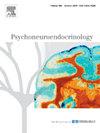葡萄糖摄入减少酒精使用障碍男性患者对酒精的渴望,并增强对线索诱导的大脑激活的习惯化:一项随机、安慰剂对照的交叉研究,研究了男性和女性AUD患者
IF 3.4
2区 医学
Q2 ENDOCRINOLOGY & METABOLISM
引用次数: 0
摘要
有证据表明食欲调节激素在酒精使用障碍中的作用。酰化胃饥饿素水平的降低与渴望和线索诱导的大脑活动的减少有关。生长素水平可以通过葡萄糖摄入而在生理上降低,因此这可能是一种治疗方法,可以减少酒精使用障碍患者的渴望和线索诱导的大脑活动,可能是由酰化的生长素介导的。材料和方法80名患有酒精使用障碍的男性和女性参加了随机安慰剂对照交叉研究,检查葡萄糖摄入作为减少渴望的急性治疗。在8个时间点评估饥饿感和胃饥饿素水平的变化。其中,43名参与者参加了功能磁共振成像(fMRI)测量,以检查随着时间的推移对线索诱发的大脑激活的习惯。渴望和激素水平随时间的变化使用线性混合模型进行分析,大脑激活习惯随时间的变化使用灵活的因子模型。结果模型显示性别与治疗对渴望的交互作用显著(F(1,474.607)= 13.563,p <; .001),男性渴望值较低(均值差=-)。540, p = 。016, 95 % ci:−。976,−.103),女性的渴望度更高(均值差=。815, p = 。005年、95年 % CI:。243, 1.387),与安慰剂组相比。治疗在男性中,我们发现了一个显著的影响(F(1313条)= 7.811,p = .006)和一个趋势,但无显著的影响acylated ghrelin (F(1301 .568) = 3.574,p = .060)的渴望以及更大的习惯cue-induced大脑激活葡萄糖摄入安慰剂相比,后壳(T(35) = 4.77,p = .019)。个体习惯斜率显著预测酒精任务前后的渴望差异(F(2,36)= 5.234,p = 0.010;B= -36.018,p = .027)。结论葡萄糖摄入可作为男性酒精使用障碍的短期治疗方法,以减少酒精渴望和提示性脑激活。应考虑性别特异性差异,以便更好地了解潜在机制,并为女性制定治疗方案。本文章由计算机程序翻译,如有差异,请以英文原文为准。
Glucose intake reduces alcohol craving and amplifies habituation to cue-induced brain activation in male patients with alcohol use disorder: A randomized, placebo-controlled crossover study examining male and female patients with AUD
Introduction
Evidence suggests a role of appetite-regulating hormones in alcohol use disorder. Reductions in acylated ghrelin levels are associated with reductions in craving and cue-induced brain activity. Ghrelin levels can be physiologically decreased by glucose intake, which therefore could be a treatment reducing craving and cue-induced brain activity in patients with alcohol use disorder, potentially mediated by acylated ghrelin.
Material and methods
80 males and females with alcohol use disorder participated in the randomized placebo-controlled crossover study, examining glucose intake as acute treatment to reduce craving. Changes in craving and ghrelin levels were assessed at eight time points. Of these, 43 participants attended fMRI measurements examining habituation to cue-induced brain activation over time. Craving and hormone levels over time were analyzed using linear mixed modeling, brain activation habituation over time using flexible factorial models.
Results
Models revealed a significant interaction effect (F(1,474.607)= 13.563, p < .001) between sex and treatment on craving, with lower craving values in males (difference in means=-.540, p = .016, 95 %CI: −.976, −.103) and higher craving in females (difference in means=.815, p = .005, 95 %CI:.243, 1.387) in the glucose compared to the placebo condition. In males, we found a significant effect of treatment (F(1,313.602)= 7.811, p = .006) and a trend, but no significant effect of acylated ghrelin (F(1,301.568)= 3.574, p = .060) on craving as well as greater habituation to cue-induced brain activation after glucose compared to placebo intake in right putamen (T(1,35)= 4.77, p = .019). Individual habituation slopes significantly predicted the difference in craving before and after the alcohol task (F(2,36)= 5.234, p = .010; B= -36.018, p = .027) in males.
Conclusions
Glucose intake could be a short-term treatment for males with alcohol use disorder to reduce alcohol craving and cue-induced brain activation. Sex-specific differences should be considered to gain a better understanding of the underlying mechanisms and develop treatment options for females.
求助全文
通过发布文献求助,成功后即可免费获取论文全文。
去求助
来源期刊

Psychoneuroendocrinology
医学-精神病学
CiteScore
7.40
自引率
8.10%
发文量
268
审稿时长
66 days
期刊介绍:
Psychoneuroendocrinology publishes papers dealing with the interrelated disciplines of psychology, neurobiology, endocrinology, immunology, neurology, and psychiatry, with an emphasis on multidisciplinary studies aiming at integrating these disciplines in terms of either basic research or clinical implications. One of the main goals is to understand how a variety of psychobiological factors interact in the expression of the stress response as it relates to the development and/or maintenance of neuropsychiatric illnesses.
 求助内容:
求助内容: 应助结果提醒方式:
应助结果提醒方式:


